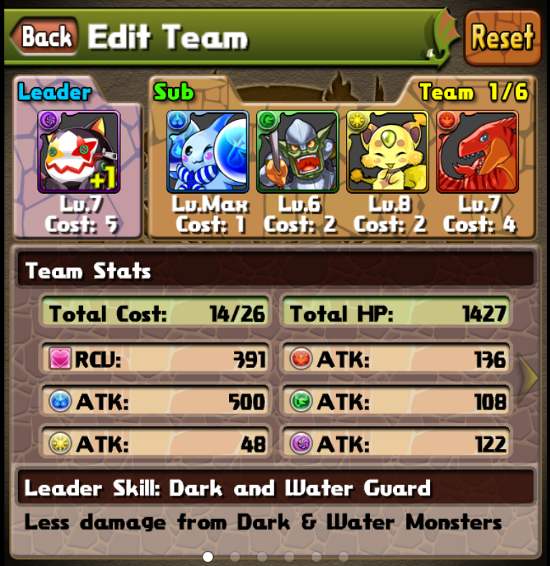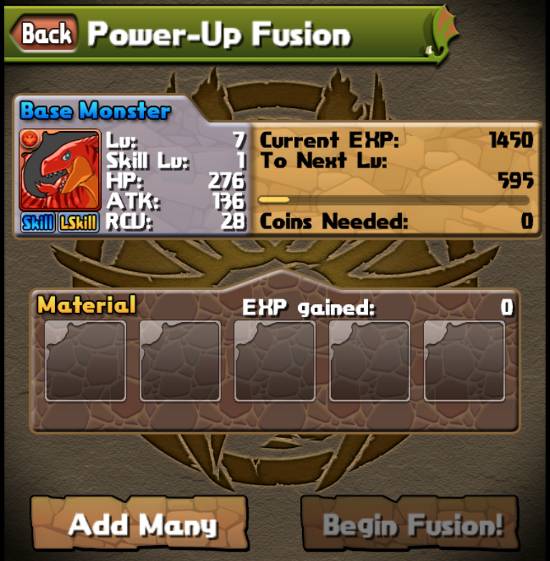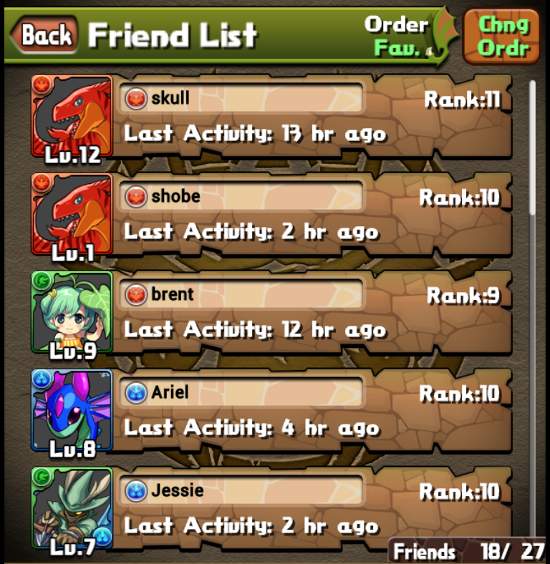If you're just getting started with Puzzle and Dragons, there's a lot to learn. In this guide, we'll be covering the FAQ's and giving you a screen-by-screen tutorial to getting started. I'll share all my tips, tricks, and other assorted strategies as we go.
The Main Menu
The menu screen is the first screen you'll encounter when you first log in.
At the top of the Puzzle and Dragons menu screen there are a number of important statistics:

- In the upper left is your username, which you picked when you signed up.
- To the right is your Rank. Your Rank goes up when the EXP bar fills, and you earn Rank EXP by completing dungeons.
- The upper right is your Magic Stone count. Magic Stones are the premium currency, and you'll earn some slowly by completing objectives.
- Below the EXP bar is the Stamina bar. You spend Stamina to explore dungeons, and it recharges at a rate of 1 point every 10 minutes. Your max Stamina is determined by your Rank.
- To the right of Stamina, below your Magic Stones, is the amount of Gold you have. You can spend Gold to fuse monsters, which we'll cover later.
At the bottom, you can switch between the various Puzzle and Dragons menus:

- Dungeon takes you to the dungeon list
- Monster takes you to your monster menu
- Shop takes you to the menu where you can buy Magic Stones (for real-world money) and spend magic stones on upgrades
- Machine takes you to the Egg Machine menus
- Friend takes you to the Friend menu, where you can manage friends and friend invites
- Others is sort of a catch all with the game's news, options, data backup, and so forth
Monster Menu
Despite the fact that the Puzzle and Dragons Dungeon menu is first, the Monster Menu should be your first stop before getting into the game. Here, you can create monster teams, level up your monsters, evolve them, and even sell them for gold.
Monsters have several important stats, which show up in several views:
- Element - one of Fire, Water, Light, Dark, or Plant.
- HP - How much HP this monster gives your team.
- ATK - How hard this monster hits when you match orbs of its element in combat
- RCV - (looks kind of like "RCU") how much HP will be restored when you match "life" squares in combat
- Level - What level the monster is. Monsters gain experience during Power-Up Fusion.
- Cost - How much it costs you to put this monster on your team. Depending on your rank, you'll have a maximum "cost" you can have total. This keeps you from just stacking all your most powerful and rare monsters on a single team.
- Skill - Some monsters have a skill that they can activate periodically during combat. This section describes that skill, if it has one.
- Leader Skill - Some monsters can give your team special benefits if they are the leader. This benefit will be described here.
Edit Team
The "Edit Team" button will take you to the Puzzle and Dragons Team Editor screen:

Here you can set up your monster teams. You can have up to 6 teams, and you can switch teams by swiping across the screen.
Each team has a "Leader" - this monster is the only one whose Leader Skill will come into play. Each team can also have up to 4 "Sub" monsters. The only restriction on teams is that the total cost of the monsters must be less than or equal to the amount of points per team you're allowed at your Rank. This is shown in the "Total Cost" line of the Team Stats.
The other stats here are the sum of all the monsters in the team's stats. Thus, having a balanced team of monsters is a good idea, so that you can both attack and heal effectively. Some monsters are better at attacking, some have healing skills, and others are important for Evo Fusion. Check your monsters' stats and what skills they have before you create your team, so that you have a better chance of success in the dungeon!
Fusion
There are two types of fusion - Power-Up Fusion, and Evo Fusion.

Power-Up Fusion takes one of your monsters and combines it with others from your box, giving the base monster experience and helping it gain levels. The other monsters are destroyed in this process, though. Monsters gain more experience from fusing with other monsters of the same element, and the more powerful the monster you sacrifice, the more experience the base monster will gain.
Evo Fusion takes a monster and makes it into a more powerful monster. In order to evolve a monster, you'll need specific monsters to combine it with. The base monster must also be at the maximum level. You can check which monsters you need in the Evo Fusion menu. Again, when you Evo Fusion a monster, only the base monster survives. Also, not all monsters can be evolved!
Both Power-Up and Evo Fusions require gold, with the gold cost determined by the base monster you're fusing with. The more powerful the monster, the more expensive it is to level up!
Other Important Menus
Before we take off into the Puzzle and Dragons Dungeon, let's go over the other menus quickly.
The Shop
The Puzzle and Dragons Shop menu will take you to the Magic Stone shop, where you can buy Magic Stones for real money. You can also trade in your Magic Stones here, to unlock certain benefits:
- You can spend 1 Magic Stone to increase your Monster Box capacity by 5 monsters. Doing this a few times at the beginning will give you more room to store monsters while you're fighting in the dungeons.
- You can also spend 1 Magic Stone to refill your Stamina. Your Stamina refills over time, so unless you've got a lot of Magic Stones, I'd suggest saving them for something else.
Egg Machines
On the Egg Machine menu, you can exchange Pal Points and Magic Stones for a chance at getting a super-rare monster.
The Magic Stone machine is guaranteed to give you a rare monster, but it costs 5 Magic Stones. Not all rare monsters are created equal - during special events like God Fests you have a much higher chance of getting very rare and powerful monsters from this machine. Therefore, it pays to save your Magic Stones for these special events.
The Pal Point machine requires 200 points per use, and it also gives you a chance at rare monsters. Pal Points are significantly easier to come by, though.
Friends

When you're exploring the dungeon, you have the option of taking one of someone else's monsters along with you. Doing this gives you one extra member in your team, which can be quite helpful. It also earns you Pal Points. If you take a monster from one of your Friends, you earn 10 Pal Points. If you take one from someone who isn't on your Friends List, you'll get 5, and also be given the option to send them a friend invite. Your own monsters also have a chance to be loaned out to people on your Friends List, which earns you Pal Points as well.
You can only borrow a friend's monster once per time they log in, and you can only borrow monsters from friends that have logged in recently. The closer you and your friends are in Rank, the longer you have to borrow their monsters. Thus, it pays to have friends who play frequently, have powerful monsters, and are close to your Rank.